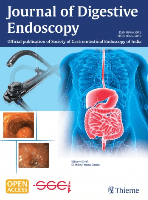
Journal of Digestive Endoscopy
Scope & Guideline
Unlocking the Future of Digestive Health
Introduction
Aims and Scopes
- Innovative Endoscopic Techniques:
The journal emphasizes novel endoscopic methodologies and tools that enhance the efficacy and safety of gastrointestinal procedures, including advanced imaging, guided interventions, and minimally invasive techniques. - Clinical Applications and Efficacy:
Research focusing on the clinical impact and outcomes of endoscopic procedures, such as endoscopic submucosal dissection, endoscopic retrograde cholangiopancreatography, and other interventions for specific gastrointestinal diseases. - Training and Skill Development:
Studies addressing the training and skill acquisition in endoscopy, emphasizing the importance of education and practice to improve procedural success and patient safety. - Multidisciplinary Approaches:
Exploration of collaborative strategies that involve gastroenterologists, surgeons, radiologists, and pathologists to optimize patient care and management of complex gastrointestinal conditions. - Emerging Technologies and Innovations:
Focus on the integration of cutting-edge technologies, including artificial intelligence and novel devices, to improve diagnostic accuracy and treatment outcomes in endoscopy.
Trending and Emerging
- Artificial Intelligence in Endoscopy:
There is a growing emphasis on the application of artificial intelligence for enhancing polyp detection, characterization, and overall diagnostic accuracy in gastrointestinal endoscopy. - Endoscopic Management of Complex Conditions:
An increase in studies addressing the endoscopic management of complex conditions such as pancreatic fluid collections, biliary obstructions, and advanced neoplasms showcases the journal's focus on high-level interventions. - Minimally Invasive Techniques:
Research on minimally invasive endoscopic procedures continues to trend upwards, with a focus on techniques that reduce patient recovery time and improve outcomes. - Interventional Endoscopy:
Emerging studies highlight the role of interventional endoscopy in managing gastrointestinal emergencies and complications, reflecting a shift towards therapeutic rather than purely diagnostic approaches. - Global Perspectives in Endoscopy:
An increase in studies that consider global health perspectives and practices in endoscopy, particularly from regions with different challenges and resource levels, is becoming more prevalent.
Declining or Waning
- Traditional Diagnostic Techniques:
There has been a noticeable decrease in studies centered around conventional diagnostic techniques that are being increasingly replaced by advanced imaging and endoscopic technologies. - General Gastrointestinal Disorders:
Research focusing on generic gastrointestinal disorders is becoming less frequent, as the journal shifts towards more specialized topics and advanced procedures that require in-depth expertise. - Outdated Endoscopic Practices:
As newer techniques and technologies emerge, older practices that lack evidence-based support are being phased out, leading to a decline in research exploring these outdated methods. - Single-Center Studies:
There is a trend away from single-center studies; the journal is increasingly favoring multicenter trials that provide broader insights and more generalizable data. - Descriptive Studies on Endoscopy:
Descriptive studies that do not contribute significantly to clinical practice or guidelines are becoming less common, as the focus shifts towards impactful research that drives clinical change.
Similar Journals
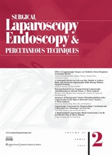
SURGICAL LAPAROSCOPY ENDOSCOPY & PERCUTANEOUS TECHNIQUES
Exploring the Frontiers of Laparoscopic InnovationSurgical Laparoscopy Endoscopy & Percutaneous Techniques is a highly regarded journal in the field of surgical innovation and technology, published by Lippincott Williams & Wilkins. This journal focuses on the latest advancements in minimally invasive surgical techniques, providing a platform for specialists to share their research and clinical experiences. With an impact factor reinforcing its significance, it is categorized in the Q2 tier within the broader field of Surgery, ranking #266 out of 551 in Scopus. The journal also has an extensive history, operating continuously since its inception in 1991 and maintaining relevance up to the present day. Researchers, professionals, and students alike can benefit from its rich content, which emphasizes the importance of innovation and collaboration in surgical practice. The journal’s commitment to disseminating crucial findings enhances its role as a vital resource in promoting advancements that ultimately improve patient outcomes.

Digestive Endoscopy
Transforming Knowledge into Clinical PracticeDigestive Endoscopy is a premier journal dedicated to publishing high-quality research in the fields of gastroenterology and radiology. Published by WILEY, this esteemed journal has established itself as a vital resource since its inception in 1989, continuing to thrive in its pursuit of advancing knowledge and practice in digestive health. With an impressive impact factor reflected by its Q1 ranking in both Gastroenterology and Radiology, Nuclear Medicine and Imaging, Digestive Endoscopy stands out as a crucial platform for researchers, practitioners, and students alike. The journal's commitment to disseminating cutting-edge findings and its strategic goal to enhance clinical practice make it indispensable for those engaged in these dynamic fields. While Open Access options are not currently available, the journal remains widely accessible through institutional subscriptions and various research databases. The Scopus rankings further underscore its significance, placing it in the top tiers of its categories, highlighting its influence and the relevance of its contributions to the global medical community.
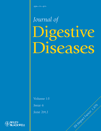
Journal of Digestive Diseases
Advancing Gastroenterology Through Innovative ResearchThe Journal of Digestive Diseases, published by WILEY, is a premier scholarly platform dedicated to advancing research and dissemination in the field of gastroenterology. With an ISSN of 1751-2972 and an E-ISSN of 1751-2980, this journal has gained notable recognition, achieving a Q2 ranking in the gastroenterology category (2023) and positioning itself in the top 30% of Scopus-ranked journals, with a rank of #49/167. Our objective is to foster a comprehensive understanding of digestive diseases through high-quality research articles, reviews, and case studies that contribute significantly to clinical practice and policy-making. Although not open access, the journal ensures broad accessibility and visibility within the academic community, catering to researchers, professionals, and students alike. As it converges from 2007 to the present, the Journal of Digestive Diseases remains a vital resource for exploring cutting-edge developments and innovative solutions in gastrointestinal health.

JOURNAL OF GASTROENTEROLOGY
Leading the way in gastroenterology research excellence.JOURNAL OF GASTROENTEROLOGY, published by SPRINGER JAPAN KK, is a premier academic journal that has been at the forefront of gastrointestinal research since its inception in 1994. With an impressive Impact Factor and ranking in the top quartile (Q1) of its category, this journal holds a significant place in the field of gastroenterology, currently ranked 12th out of 167 in Scopus, placing it in the 93rd percentile. The journal serves as an essential platform for disseminating innovative research, clinical studies, and reviews that foster advancements in the understanding and treatment of gastrointestinal diseases. Although it does not offer Open Access options, it provides researchers, clinicians, and students access to crucial insights and breakthroughs pivotal to improving patient care and outcomes in gastroenterology. With a commitment to high-quality peer-reviewed content, JOURNAL OF GASTROENTEROLOGY plays a vital role in shaping the future of gastrointestinal health and research.

DIGESTIVE DISEASES
Pioneering Research in Digestive Health.DIGESTIVE DISEASES, published by KARGER, stands as a leading international journal dedicated to the field of gastroenterology and digestive health. With an ISSN of 0257-2753 and E-ISSN 1421-9875, the journal has been providing a platform for high-quality research since its inception in 1983, continuing to disseminate groundbreaking findings and insights through to 2024. Positioned in the second quartile (Q2) of both the gastroenterology and miscellaneous medicine categories as of 2023, DIGESTIVE DISEASES is recognized for its rigorous peer-review process and its contributions to advancing clinical and experimental gastroenterological knowledge. Its Scopus ranking at #62 out of 167 in the gastroenterology field reflects its significant impact, as it reaches a notable 63rd percentile among its peers. While it does not currently offer open access options, its subscription model ensures that vital research is available to professionals and institutions committed to the field. The journal serves as an essential resource for researchers, clinicians, and students alike who seek to deepen their understanding of digestive disorders and their implications in medicine.

International Journal of Gastrointestinal Intervention
Shaping the Future of Gastrointestinal MedicineInternational Journal of Gastrointestinal Intervention is a distinguished open-access journal published by the SOC GASTROINTESTINAL INTERVENTION that has been committed to disseminating critical research since its inception in 2012. Based in the Netherlands, this journal focuses on the dynamic fields of gastroenterology, hepatology, oncology, and radiology, offering a platform for innovative studies and clinical interventions that can significantly impact patient care and medical practice. With its incorporation into Scopus and ranked within the lower quartiles in various categories as of 2023, the journal acknowledges the evolving landscape of medical research and seeks to continually elevate its contributions to knowledge in these specialized areas. By embracing open access since its founding, the journal ensures that cutting-edge research findings are accessible to a global audience, fostering collaboration and knowledge sharing among researchers, professionals, and students. The journal aims to be a premier source of information and a catalyst for advancements in gastrointestinal interventions, making it an essential resource for those dedicated to improving health outcomes in these critical medical fields.
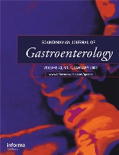
SCANDINAVIAN JOURNAL OF GASTROENTEROLOGY
Illuminating the Complexities of Gastrointestinal DiseasesSCANDINAVIAN JOURNAL OF GASTROENTEROLOGY, published by Taylor & Francis Ltd, is a leading journal in the field of gastroenterology, dedicated to advancing clinical and experimental research related to digestive health. With an ISSN of 0036-5521 and an E-ISSN of 1502-7708, this journal provides a platform for high-quality research that addresses the complexities of gastrointestinal diseases. Since its inception in 1966, the journal has consistently contributed valuable insights and is currently categorized in the Q2 quartile of gastroenterology journals, reflecting its impact and relevance in the field, with a Scopus rank of 87 out of 167 in Medicine - Gastroenterology. Researchers and practitioners are encouraged to explore the journal's archives to enhance their understanding and stay abreast of innovative strategies for managing gastrointestinal disorders. The SCANDINAVIAN JOURNAL OF GASTROENTEROLOGY remains a crucial resource for those committed to improving patient outcomes through rigorous scientific inquiry and the sharing of impactful findings.
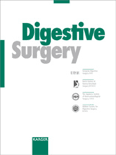
DIGESTIVE SURGERY
Pioneering Research in Gastrointestinal SurgeryDIGESTIVE SURGERY, published by KARGER in Switzerland, is a leading journal at the forefront of its field, focusing on innovative surgical techniques and advancements in gastrointestinal surgery. With an ISSN of 0253-4886 and an E-ISSN of 1421-9883, this esteemed journal has been disseminating critical research since its inception in 1984, and is set to continue shaping the discipline until 2024. DIGESTIVE SURGERY holds an impressive impact factor, reflected in its 2023 ranking, positioned in the Q2 quartile for Gastroenterology and Q1 for Surgery. It is recognized within the Scopus database as #93 out of 551 in Surgery and #61 out of 167 in Gastroenterology, placing it in the top percentiles of both fields. While the journal is not open access, it remains a pivotal resource for practitioners, researchers, and students seeking to deepen their understanding of surgical practices and innovations that enhance patient care.

DIGESTION
Innovating clinical practices for enhanced digestive health.DIGESTION is a prestigious journal dedicated to advancing the field of gastroenterology, published by KARGER, a renowned publisher based in Switzerland. With a rich history dating back to 1896, this journal has continuously evolved and serves as a vital platform for researchers, professionals, and students alike. DIGESTION is recognized for its scholarly contributions, holding an impressive rank of 23 out of 167 in the Scopus database, placing it within the top 14% of gastroenterology journals, as evidenced by its Q2 classification. The journal's commitment to high-quality research is reflected in its wide-ranging scope, addressing various aspects of digestive health, clinical practices, and innovative therapies. Though not an open-access journal, it provides comprehensive access options that ensure the dissemination of crucial research findings to the global community. As we move towards 2024, DIGESTION continues to facilitate dialogue and insights in gastroenterological research, making it an indispensable resource for those in the field.

Indian Journal of Gastroenterology
Bridging Research and Practice in Gastrointestinal HealthThe Indian Journal of Gastroenterology, a prominent publication in the field of gastroenterology, is published by Springer India. With roots dating back to 1982 and an ongoing commitment to disseminating high-quality research, this journal serves as a vital platform for researchers, practitioners, and students interested in gastrointestinal health and diseases. It boasts an impressive track record with a Scopus rank of #82 in the gastroenterology category and a 2023 quartile ranking of Q3, firmly situating it within the competitive landscape of medical journals. Although it is not an open-access journal, the Indian Journal of Gastroenterology offers accessible research articles contributing significantly to the field, facilitating informed discussion and advancing knowledge in gastrointestinal medicine. The journal's comprehensive focus covers a wide range of topics from clinical studies to innovative therapeutic approaches, ensuring its relevance to current medical practices and the evolving challenges in gastroenterology.